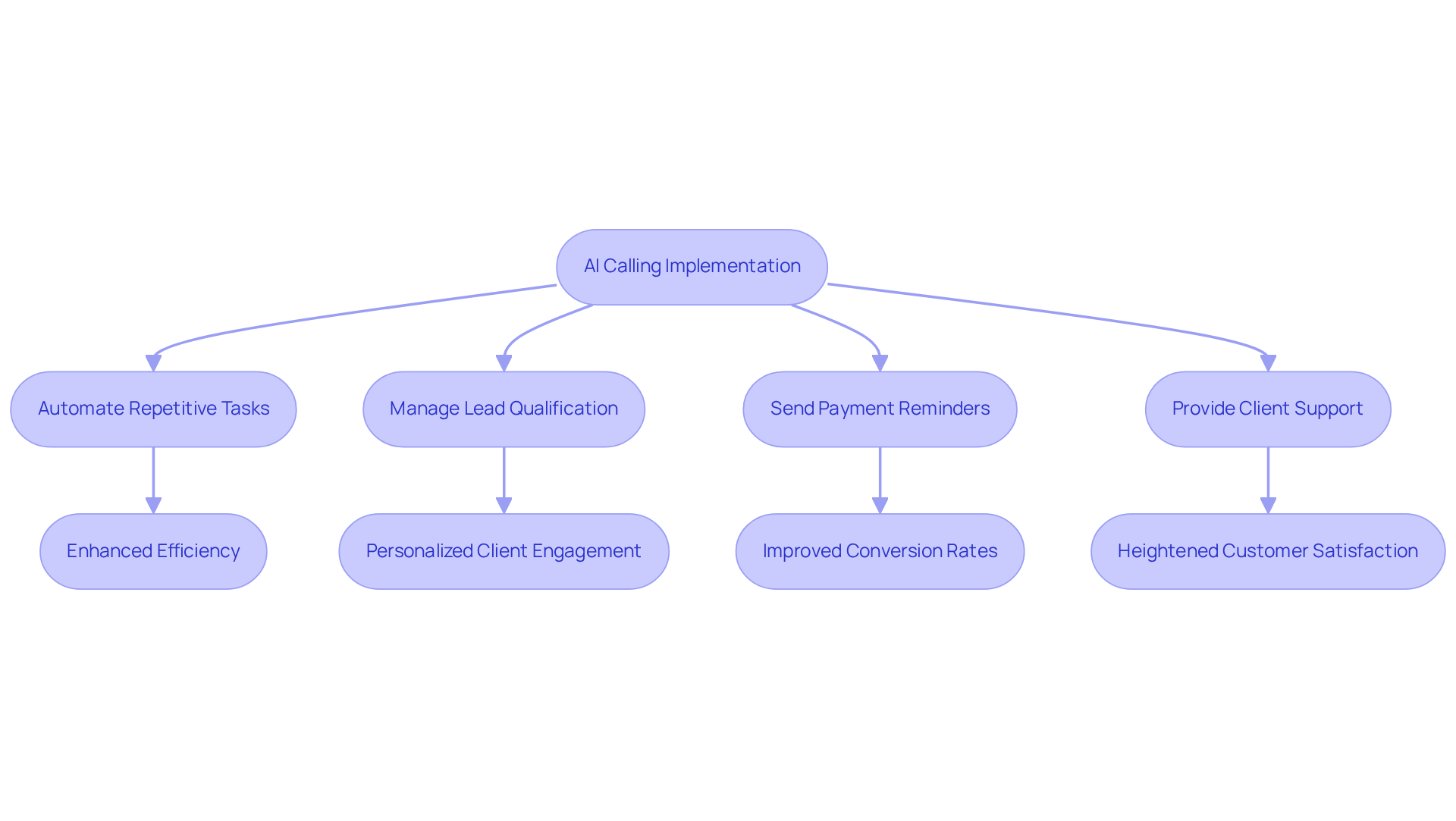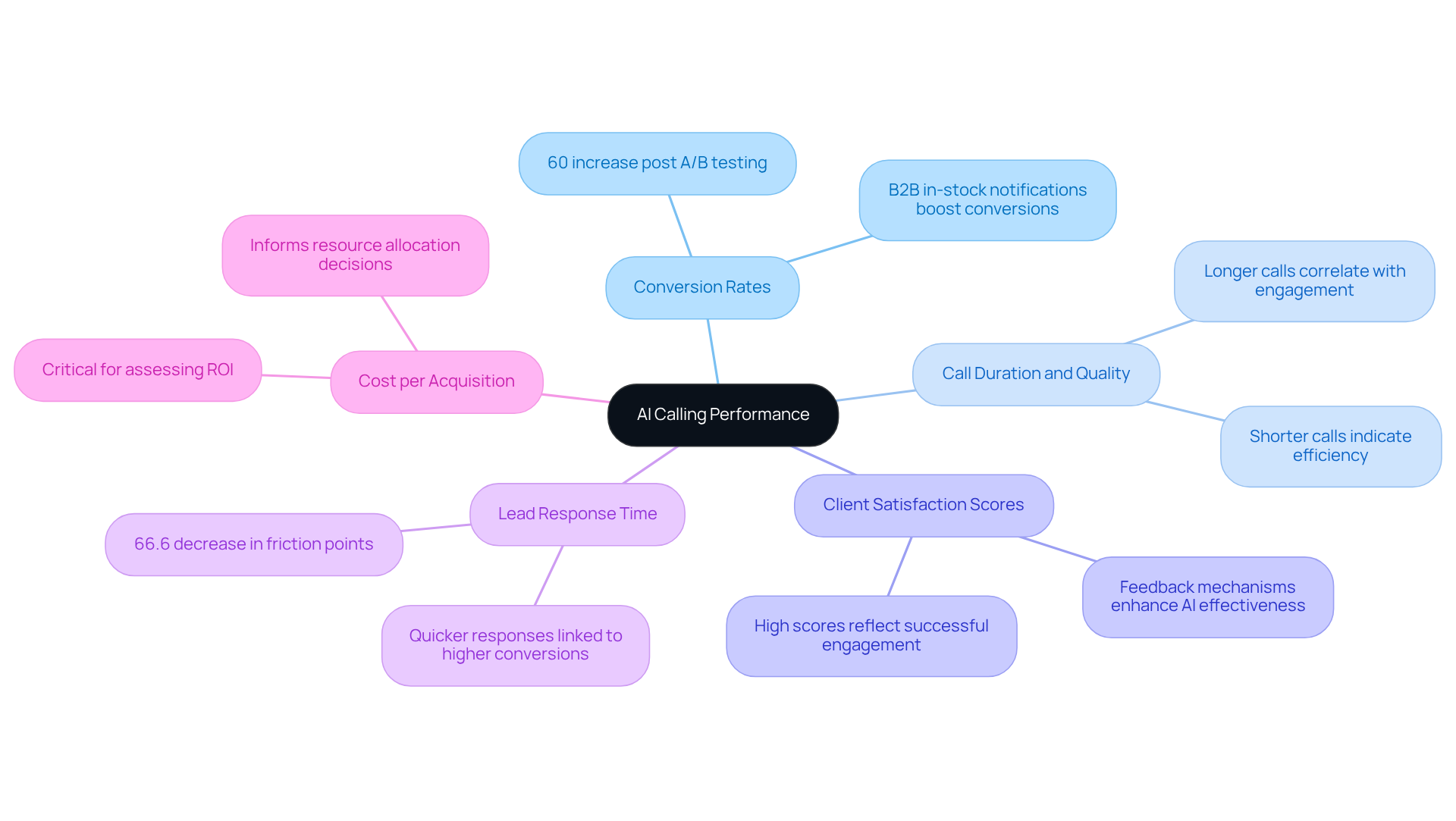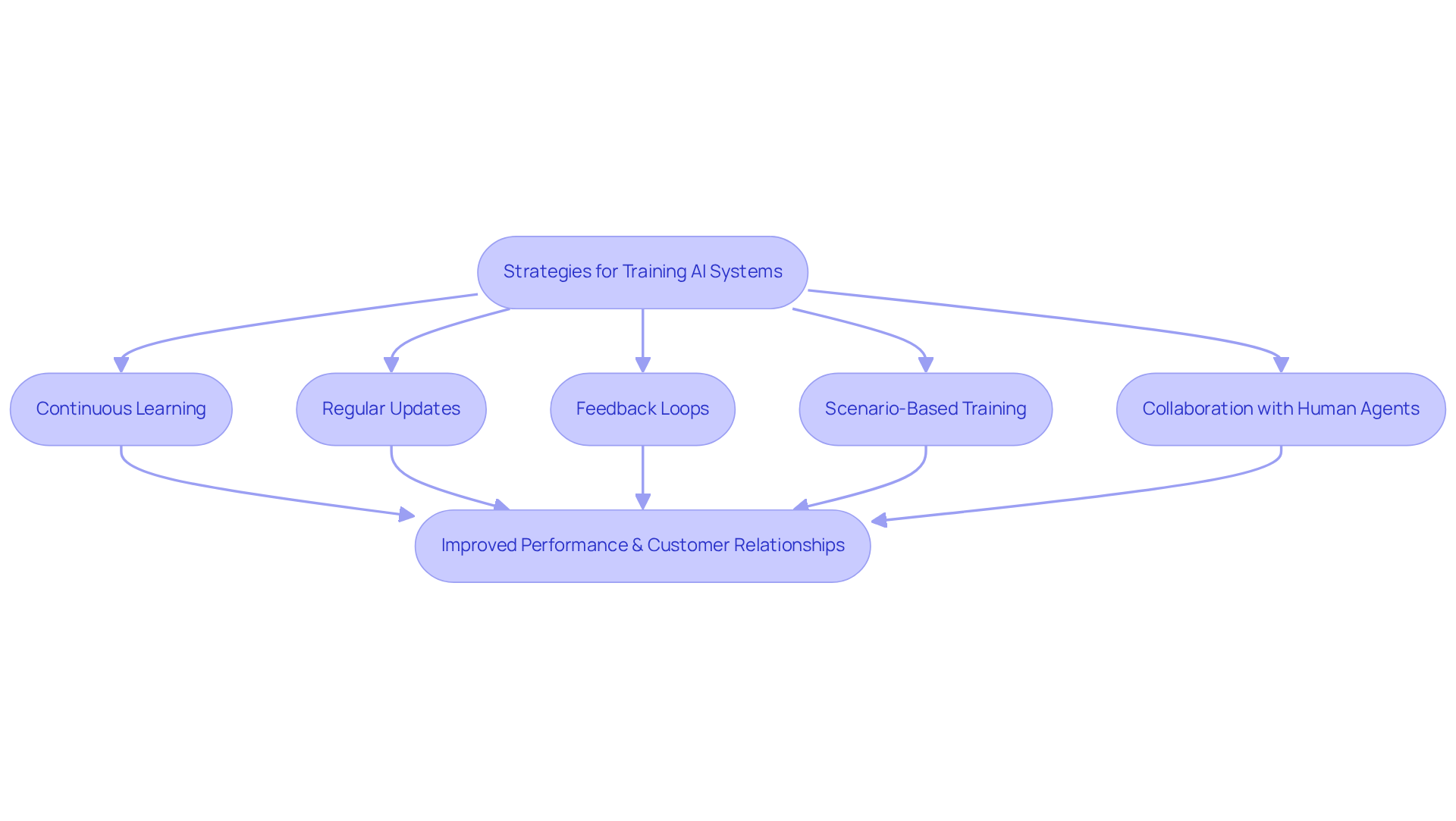Overview
This article delineates best practices for the effective integration of AI calling into sales management. It underscores the necessity of:
- Establishing clear objectives
- Selecting the appropriate technology
- Providing comprehensive team training
- Monitoring performance
- Engaging in continuous optimization
Evidence supports these practices, demonstrating that organizations can markedly enhance lead conversion rates and operational efficiency by leveraging AI calling systems that are responsive to market demands and elevate customer engagement.
Introduction
In an era where technology is fundamentally reshaping the sales landscape, AI calling stands out as a transformative force in sales management. This innovative tool streamlines repetitive tasks and empowers sales teams to concentrate on meaningful client interactions, thereby driving efficiency and personalization. Yet, as organizations hastily adopt AI solutions, a pressing challenge arises: how can they effectively integrate these systems to maximize performance and achieve tangible results? Delving into best practices for AI calling integration unveils the essential strategies for unlocking its full potential, ultimately revolutionizing sales strategies for the better.
Understand the Role of AI Calling in Modern Sales
AI calling has emerged as a pivotal instrument in contemporary sales oversight, enabling enterprises to automate repetitive tasks while focusing on high-value interactions. By harnessing advanced algorithms and machine learning, Intone's AI voice agents utilize AI calling to effectively manage lead qualification, payment reminders, and client support, thereby significantly alleviating the workload on human agents. This technology not only enhances efficiency but also ensures that teams can engage with clients in a more personalized manner.
For instance, AI can analyze client data to identify high-intent prospects, enabling representatives to direct their efforts with precision. Furthermore, Intone's AI calling voice agents enhance upselling strategies and client re-engagement, resulting in elevated conversion rates. With , organizations can refine their marketing approaches, leading to improved operational efficiency and heightened customer satisfaction.
Consequently, companies that adopt Intone's AI communication can expect a transformative impact on their revenue processes, establishing it as an indispensable component of modern sales strategies.

Implement Best Practices for AI Calling Integration
To effectively integrate AI calling into your sales operations, adhere to these best practices:
- Define Clear Objectives: Establish specific goals for your AI calling initiatives, such as boosting lead conversion rates or enhancing customer engagement. This clarity will guide your strategy and measure success. Research indicates that companies incorporating AI calling in their selling process reported over 50% more leads and appointments post-implementation, underscoring the importance of clear objectives. Intone's AI calling representatives have shown a 1.5x increase in conversion rates compared to human representatives, highlighting the potential impact of well-defined objectives.
- Choose the Right Technology: Select AI tools that align with your business needs. Prioritize features such as telephony integration, real-time analytics, and customizable scripts to ensure the technology supports your objectives. Intone’s AI voice solutions offer a purpose-built real-time voice system with sub-500ms latency, facilitating smooth, natural conversations even during peak volumes, making them an excellent choice for enhancing performance.
- Train Your Team: Equip your sales team with comprehensive training on effectively utilizing AI tools. This training should encompass interpreting AI-generated insights and feedback, which is crucial for maximizing the technology's potential. With Intone's dedicated engineers guiding the setup process, your team can swiftly adapt to using AI calling voice agents.
- Monitor Performance: Regularly evaluate the performance of your AI calling system. Utilize metrics such as call completion rates and to assess effectiveness and identify areas for improvement. Intone’s advanced analytics empower you to personalize how the AI calling agent engages with clients, providing valuable insights for ongoing assessment.
- Iterate and Optimize: Continuously enhance your AI outreach strategies based on performance data and input from your sales personnel. This iterative approach allows you to adapt to evolving market conditions and customer preferences, ensuring sustained success. By following these practices, organizations can leverage AI calling technology, like Intone's customizable voice agents, to improve their sales processes, ultimately leading to enhanced efficiency and higher conversion rates. Additionally, addressing common challenges, such as integration difficulties faced by 28% of respondents, can help avoid potential pitfalls and ensure a smoother implementation.

Measure and Optimize AI Calling Performance
To effectively measure and optimize the performance of your AI calling system, it is imperative to focus on the following key performance indicators (KPIs):
- Conversion Rates: Monitor the percentage of leads that transform into clients as a direct result of AI calling efforts. This metric is essential for evaluating the effectiveness of your AI strategies. Studies indicate that organizations can see a 60% increase in conversion rates after implementing A/B testing and optimizing their AI systems.
- Call Duration and Quality: Assess the average duration of calls alongside the quality of interactions. Research indicates that longer calls often correlate with more engaged clients, while shorter calls may suggest operational efficiency. Comprehending these dynamics can assist in enhancing your strategy for client interaction.
- Client Satisfaction Scores: Implement surveys and feedback mechanisms to measure client satisfaction with AI interactions. High satisfaction scores reflect successful engagement in AI calling. Organizations that prioritize client feedback can enhance the effectiveness of their AI systems.
- Lead Response Time: Evaluate how quickly leads are contacted following initial engagement. Quicker response times are often associated with increased conversion rates. Data indicates that a 66.6% decrease in typical friction points can greatly enhance user interactions.
- Cost per Acquisition: Calculate the expenses involved in obtaining new customers through AI communication. This metric is crucial for assessing the return on investment (ROI) of your AI initiatives, allowing for informed decisions about resource allocation.
By consistently tracking these KPIs, organizations can identify areas for enhancement and make data-informed modifications to their AI calling strategies. This ultimately and operational efficiency.

Train and Adapt AI Systems for Evolving Sales Needs
To maintain the effectiveness of your AI calling systems, consider implementing the following strategies for training and adaptation:
- Continuous Learning: Leverage machine learning algorithms that enable your AI systems to learn from past interactions, enhancing their performance over time. This flexibility is essential for remaining pertinent in a swiftly evolving market, as AI is expected to accomplish 60% of transaction tasks by 2028.
- Regular Updates: Ensure your AI systems are consistently updated with the latest industry data and trends. Refreshing scripts and training data to align with current client preferences and behaviors is essential for maintaining engagement and effectiveness.
- Feedback Loops: Establish strong systems for collecting input from both clients and sales representatives. Employing this feedback facilitates the enhancement of AI interactions, resulting in improved performance and user satisfaction.
- Scenario-Based Training: Train your AI systems using a diverse range of real-world scenarios. This method improves their capability to handle various client interactions efficiently, ensuring they can react suitably to different scenarios.
- Collaboration with Human Agents: Encourage cooperation between AI systems and human representatives. This hybrid model leverages the advantages of both, improving overall revenue effectiveness and guaranteeing a more tailored client experience.
By prioritizing these training and adaptation strategies, organizations can ensure their AI calling systems evolve alongside their sales needs, ultimately driving better results and fostering stronger customer relationships.

Conclusion
AI calling has emerged as an essential tool in enhancing sales management, fundamentally transforming how businesses engage with clients and streamline their processes. By effectively automating routine tasks, AI technology empowers sales teams to concentrate on meaningful interactions, ultimately driving superior results and increasing efficiency. The successful integration of AI calling is contingent upon clear objectives, the right technology, comprehensive training, and continuous performance monitoring, which collectively enable organizations to harness the full potential of this innovative approach.
Throughout this article, key practices for implementing AI calling have been delineated:
- Establishing clear goals guarantees that AI initiatives align with business objectives.
- Selecting appropriate tools and training staff maximizes the impact of AI solutions.
- Regular performance assessments and iterative optimizations allow companies to adapt to evolving market dynamics and customer preferences, ultimately leading to improved conversion rates and enhanced customer satisfaction.
Embracing AI calling transcends mere trendiness; it is a strategic imperative that can redefine sales success. By committing to the best practices discussed, organizations can position themselves at the forefront of sales innovation, leveraging AI to cultivate stronger customer relationships and drive substantial growth. The future of sales management is upon us, and those who adapt and integrate these technologies will undoubtedly reap the rewards.
Frequently Asked Questions
What is the role of AI calling in modern sales?
AI calling plays a crucial role in modern sales by automating repetitive tasks, allowing sales teams to focus on high-value interactions.
How does Intone's AI voice agent utilize AI calling?
Intone's AI voice agents use AI calling to manage lead qualification, payment reminders, and client support, reducing the workload on human agents.
What are the benefits of using AI calling in sales?
The benefits include enhanced efficiency, personalized client engagement, improved upselling strategies, and increased conversion rates.
How does AI calling help in identifying high-intent prospects?
AI can analyze client data to pinpoint high-intent prospects, enabling sales representatives to direct their efforts more effectively.
What impact does AI calling have on marketing approaches?
With real-time tracking and analytics, AI calling allows organizations to refine their marketing strategies, leading to improved operational efficiency and customer satisfaction.
What can companies expect by adopting Intone's AI communication?
Companies can expect a transformative impact on their revenue processes, making AI communication an essential part of modern sales strategies.






